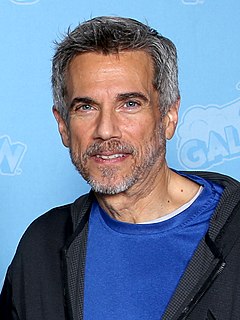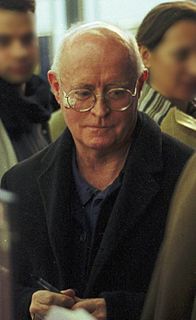A Quote by Rebecca Goldstein
What is remarkable about the Greeks - even pre-philosophically - is that despite the salience of religious rituals in their lives, when it came to the question of what it is that makes an individual human life worth living they didn't look to the immortals but rather approached the question in mortal terms. Their approaching the question of human mattering in human terms is the singularity that creates the conditions for philosophy in ancient Greece, most especially as these conditions were realized in the city-state of Athens.
Quote Topics
About
Ancient
Ancient Greece
Approaching
Athens
Came
City
Conditions
Creates
Despite
Even
Greece
Greeks
Human
Human Life
Individual
Life
Life Worth Living
Lives
Living
Look
Makes
Mortal
Most
Philosophy
Question
Rather
Realized
Religious
Religious Rituals
Remarkable
Rituals
Singularity
State
Terms
Were
Worth
Worth Living
Related Quotes
In every civilization, life grows easier. Men grow lazier in consequence. We have a picture of what happened to the individual Greek. (I cannot look at history, or at any human action, except as I look at the individual.) The Greeks had good food, good witty talk, pleasant dinner parties; and they were content. When the individual man had reached that condition in Athens, when the thought not of giving to the state but of what the state could give to him, Athens' freedom was doomed.
The real question today is not when human life begins, but, what is the value of human life? The abortionist who reassembles the arms and legs of a tiny baby to make sure all its parts have been torn from its mother's body can hardly doubt whether it is a human being. The real question for him and for all of us is whether that tiny human life has a God-given right to be protected by the law - the same right we have.
. . . the example given by the Nazi regime as to the ability of a modern state to destroy human lives with the same techniques used by modern industry, employing the bureaucratic apparatus readily available to any modern state, is one that can hardly be ignored. Because although history may not repeat itself, it is rare that anything introduced to human history is not used again. Whether the Holocaust was unique or not in terms of its precedents is one question; whether it will remain so is quite another.
I believe in recognizing every human being as a human being--neither white, black, brown, or red; and when you are dealing with humanity as a family there's no question of integration or intermarriage. It's just one human being marrying another human being or one human being living around and with another human being.
The test of the life of a saint is not success, but faithfulness in human life as it actually is. We will set up success in Christian work as the aim; the aim is to manifest the glory of God in human life, to live the life hid with Christ in God in human conditions. Our human relationships are the actual conditions in which the ideal life of God is to be exhibited.
Interruption, incoherence, surprise are the ordinary conditions of our life. They have even become real needs for many people, whose minds are no longer fed by anything but sudden changes and constantly renewed stimuli. We can no longer bear anything that lasts. We no longer know how to make boredom bear fruit. So the whole question comes down to this: can the human mind master what the human mind has made?
The popular and scientific views of "race" no longer coincide. The word "race," as applied scientifically to human groupings, has lost any sharpness of meaning. To-day it is hardly definable in scientific terms, except as an abstract concept which may, under certain conditions, very different from those now prevalent, have been realized approximately in the past and might, under certain other but equally different conditions, be realized in the distant future.
What is the meaning of human life, or, for that matter, of the life of any creature? To know the answer to this question means to be religious. You ask: Does it make any sense, then, to pose this question? I answer: The man who regards his fellow creatures as meaningless is not merely unhappy but hardly fit for life.







































